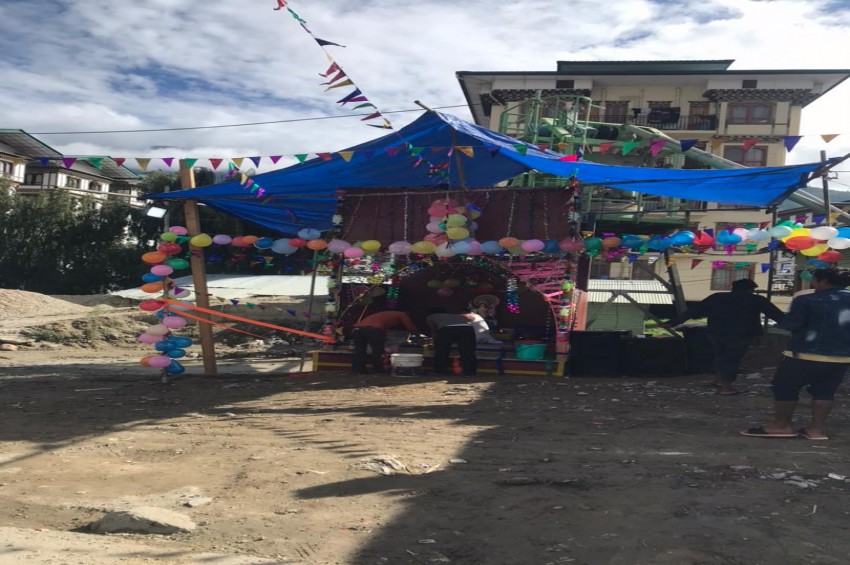The national environment commission (NEC) and Thimphu Thromde issued a notice, reminding the waste management issues, particularly the ritualistic wastes generated during the Lord Vishwakarma’s puja.
“The dumping of general and ritual waste into water bodies is strictly prohibited. Please ensure that your waste is properly segregated before dumping in the designated vehicle during normal waste collection vehicles or site (Memelakha landfill) if transported in a private car,” state the Thromde’s notice.
As people across the country celebrate Lord Vishwakarma’s day, sculptures and portraits are placed in businesses and factories.
A supervisor at one of the construction sites in Thimphu said, “The waste generated during the celebration needs a proper disposal area, as it can’t be dumped with the general waste due to sentiments attached with the statues,” said another supervisor.
Similarly, people who perform rituals and make ritual cakes as a part are also unsure where to dispose of their waste in order to comply with NEC and Thromde’s notification. Many claimed that they feel uneasy to dispose of it off together with general waste.
NEC’ notification stated: “The sculptures and ritualistic objects are typically discarded into the rivers after the ceremony. Until 2019, the National Environment Commission declared it harmful to dispose of statues in the river as it leads to lead and mercury poisoning.”
Similarly, this year, the National Environment Commission notified the concerned agencies regarding the disposal of waste into the water bodies during the Vishwakarma Puja.
Citing the National Environment Act of 2007, the Waste Management Prevention and Management Act of 2007 and the Water Act of Bhutan 2011, the central and local governments are reminded to identify appropriate places to dispose of religious waste and monitor illegal dumping.
Every year, on September 17, Vishwakarma ritual is celebrated with pomp across the country particularly by the Indian workers in various building construction sites and the owners of vehicle and machinery companies.
However, For the last two years, with the subsequent Covid-19 lockdowns and to reduce the spread and transmission of the virus, measures and protocols in place. The celebration of the celestial or the mythical chief carpenter’s days remained low-key.
With relaxation on Covid-19 protocols, the festive vibes of Vishawakarma ritual filled the air. One can hear loud music being played. The altars for the clay statue are built with balloons, ribbons, banana trees, flowers and plastic decorative ornaments.
However beautiful the decorations of the vehicles, construction sites and the machines are, eventually the down side of the celebration is the waste generated. Particularly, the disposal of plastic-made decorative ornaments.
While most of the construction supervisors and workshop owners are aware of the notification, some were unaware.
One of the construction supervisors said, “The Thromde officials didn’t give us the clear instruction but we are aware that we must refrain from disposing religious waste into the rivers.”
“If we are not sure what to do with the religious waste, we were told to contact the given number,” added another worker.
Likewise, another worker said, “We were instructed by our supervisor to call him before disposing of the religious waste.”
Another worker claimed that they usually send off the clay-made statues of the idols into a river as per their culture and tradition. He said, “The clay will dissolve as carried downstream by the river and there’s a small grain of relics that will sink in the river.”
However, disposing of any sort of waste in the water bodies is illegal.
Lord Vishwakarma, also known and believed to be the craftsman deity wards off negative energies from the work stations. Known to the god and the greatest architect of the universe, its clay idols are sculpted in the neighboring border towns of India.
Every year, hundreds of Vishwakarma’s statues varying in sizes and styles are imported to motivate the workers.
The owner of a newly constructed residential building said, “As per the supervisors’ requirement, we place an order for the statue and decorative pieces. We even provide them food and drinks. They look happy while celebrating it like a new year. We always keep some budget aside to celebrate the day. I believe the work progresses smoothly afterwards.”
“Supervisors will instruct the workers to take care of the trash generated during the celebration and also dispose the statue under his guidance,” added the owner.
It’s not only the skilled foreign workers filled with divine sentiments on the day but also some Bhutanese drivers, carpenters, craftsmen, mechanics from various businesses, factories, and industries manage some time to observe the day.
The day is celebrated to mark the birth anniversary of Lord Vishwakarma. Particularly by the Hindu community. However, religions play little role, it’s the collective mood set during the day. Children, adults and elderlies usually hop from one celebration site to another, joining the energetic dancers and those who believe in the power of the Lord Vishwakarma.
Lord Vishwakarma’s architectural skill is also reflected in Buddhist scriptures. The celestial architect built a triple golden ladder for the Buddha Skyamuni to descend from Lhayul Sumchu-tsa-sum (Tushita) after preaching to his mother.
“I remember my Dzongkha teacher narrating that story but I wonder if there’s a representational statue of the dzow Vishwakarma in the temples,” said Yeshey watching people celebrate the day.
Hindu belief and credits Lord Vishwakarma for creating the world, constructing Lord Krishna’s capital city Dwarka. He is also credited with inventing Sthapatya Veda, the science of mechanics and construction.
The majority of businesses, manufacturers, and industries participate in the festival. Workers in factories and other industrial settings worship their equipment and tools on this day and pray to Lord Vishwakarma for the security of their livelihoods.
On the day of Vishwakarma Puja, they offer prayers for the flawless operation of machinery and abstain from using their tools. The sacred sentiments attached with the festival has left many confused regarding the disposal issue.
“The dumping of general and ritual waste into water bodies is strictly prohibited. Please ensure that your waste is properly segregated before dumping in the designated vehicle during normal waste collection vehicles or site (Memelakha landfill) if transported in a private car,” state the Thromde’s notice.
As people across the country celebrate Lord Vishwakarma’s day, sculptures and portraits are placed in businesses and factories.
A supervisor at one of the construction sites in Thimphu said, “The waste generated during the celebration needs a proper disposal area, as it can’t be dumped with the general waste due to sentiments attached with the statues,” said another supervisor.
Similarly, people who perform rituals and make ritual cakes as a part are also unsure where to dispose of their waste in order to comply with NEC and Thromde’s notification. Many claimed that they feel uneasy to dispose of it off together with general waste.
NEC’ notification stated: “The sculptures and ritualistic objects are typically discarded into the rivers after the ceremony. Until 2019, the National Environment Commission declared it harmful to dispose of statues in the river as it leads to lead and mercury poisoning.”
Similarly, this year, the National Environment Commission notified the concerned agencies regarding the disposal of waste into the water bodies during the Vishwakarma Puja.
Citing the National Environment Act of 2007, the Waste Management Prevention and Management Act of 2007 and the Water Act of Bhutan 2011, the central and local governments are reminded to identify appropriate places to dispose of religious waste and monitor illegal dumping.
Every year, on September 17, Vishwakarma ritual is celebrated with pomp across the country particularly by the Indian workers in various building construction sites and the owners of vehicle and machinery companies.
However, For the last two years, with the subsequent Covid-19 lockdowns and to reduce the spread and transmission of the virus, measures and protocols in place. The celebration of the celestial or the mythical chief carpenter’s days remained low-key.
With relaxation on Covid-19 protocols, the festive vibes of Vishawakarma ritual filled the air. One can hear loud music being played. The altars for the clay statue are built with balloons, ribbons, banana trees, flowers and plastic decorative ornaments.
However beautiful the decorations of the vehicles, construction sites and the machines are, eventually the down side of the celebration is the waste generated. Particularly, the disposal of plastic-made decorative ornaments.
While most of the construction supervisors and workshop owners are aware of the notification, some were unaware.
One of the construction supervisors said, “The Thromde officials didn’t give us the clear instruction but we are aware that we must refrain from disposing religious waste into the rivers.”
“If we are not sure what to do with the religious waste, we were told to contact the given number,” added another worker.
Likewise, another worker said, “We were instructed by our supervisor to call him before disposing of the religious waste.”
Another worker claimed that they usually send off the clay-made statues of the idols into a river as per their culture and tradition. He said, “The clay will dissolve as carried downstream by the river and there’s a small grain of relics that will sink in the river.”
However, disposing of any sort of waste in the water bodies is illegal.
Lord Vishwakarma, also known and believed to be the craftsman deity wards off negative energies from the work stations. Known to the god and the greatest architect of the universe, its clay idols are sculpted in the neighboring border towns of India.
Every year, hundreds of Vishwakarma’s statues varying in sizes and styles are imported to motivate the workers.
The owner of a newly constructed residential building said, “As per the supervisors’ requirement, we place an order for the statue and decorative pieces. We even provide them food and drinks. They look happy while celebrating it like a new year. We always keep some budget aside to celebrate the day. I believe the work progresses smoothly afterwards.”
“Supervisors will instruct the workers to take care of the trash generated during the celebration and also dispose the statue under his guidance,” added the owner.
It’s not only the skilled foreign workers filled with divine sentiments on the day but also some Bhutanese drivers, carpenters, craftsmen, mechanics from various businesses, factories, and industries manage some time to observe the day.
The day is celebrated to mark the birth anniversary of Lord Vishwakarma. Particularly by the Hindu community. However, religions play little role, it’s the collective mood set during the day. Children, adults and elderlies usually hop from one celebration site to another, joining the energetic dancers and those who believe in the power of the Lord Vishwakarma.
Lord Vishwakarma’s architectural skill is also reflected in Buddhist scriptures. The celestial architect built a triple golden ladder for the Buddha Skyamuni to descend from Lhayul Sumchu-tsa-sum (Tushita) after preaching to his mother.
“I remember my Dzongkha teacher narrating that story but I wonder if there’s a representational statue of the dzow Vishwakarma in the temples,” said Yeshey watching people celebrate the day.
Hindu belief and credits Lord Vishwakarma for creating the world, constructing Lord Krishna’s capital city Dwarka. He is also credited with inventing Sthapatya Veda, the science of mechanics and construction.
The majority of businesses, manufacturers, and industries participate in the festival. Workers in factories and other industrial settings worship their equipment and tools on this day and pray to Lord Vishwakarma for the security of their livelihoods.
On the day of Vishwakarma Puja, they offer prayers for the flawless operation of machinery and abstain from using their tools. The sacred sentiments attached with the festival has left many confused regarding the disposal issue.















